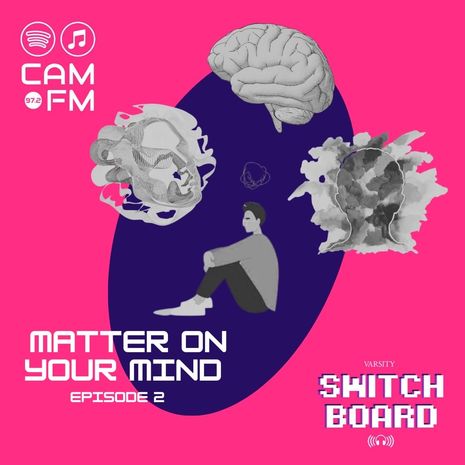Switchboard: Matter On Your Mind (S7, Ep.2)
Izzy and her guest host Libby Warr discuss student mental health in honour of Mental Health Awareness Week. The theme this year is ‘Nature and the Environment.’
CN: This episode contains detailed discussion of mental health conditions.

In the second episode of this season’s Switchboard, Izzy and Libby hear from students who have struggled with mental health, who have studied mental health, and who provide support for those who are struggling. Throughout these discussions, the episode explores the importance of mental health awareness and the necessity for these conversations at Cambridge.
The episode opens by introducing this week’s guest host, Libby, who is one of the Welfare Officers on Homerton College’s JCR and studies Education, Psychology and Learning. Libby discusses what being a Welfare Officer entails, including the support they can provide to students. She says that a particular difficulty this year has been adapting to online welfare, especially when supporting students in isolation, and talks about how events such as arts and crafts were made virtual. The duo also discuss Libby’s motivations behind becoming a Welfare Officer, where Libby details the importance of a work life balance. As the pair reminds listeners, there are twenty-four hours in a day. They round off their conversation by emphasising why Mental Health Awareness Week is important as a preventative measure, rather than a prognostic one.
The hosts then interview Alicia, a PHD student at the MRC Cognition and Brain Sciences Unit, whose research is in mental health. Alicia discusses her thoughts on the rising rates of mental illness, the impact of the pandemic and the importance of sharing experiences with mental illness. She states that new stresses have been placed on students because of having to adapt to new ways of teaching and being examined, before talking in more detail about burnout – which is not a mental illness itself, but can stem from/lead to mental health problems. Prior to the pandemic, Alicia notes that mental health issues were increasing, and awareness of them was becoming more prevalent.
The conversation moves on to discuss anxiety and knowing when you should seek advice. The episode provides multiple routes for seeking help, such as the Samaritans or calling 111 in case of a crisis. For students at Cambridge, there are also College nurses and Tutors available for support and advice, however a less college-based route would be to talk to your GP, the University Counselling Service, the British Association for Counselling and Psychotherapy, and the Cambridge Nightline helpline.
The hosts then go on to talk to Natalie, the Publicity Officer for Cambridge Nightline and one of the public faces for the service. Natalie highlights that it’s not necessary to be at breaking point in order to seek help for mental health, as there is no issue too small. In terms of volunteering with the helpline, Natalie emphasises how important the act of active listening is in providing support.
Following on from Natalie, Izzy and Libby interview Jessica, a Research Associate in the Department of Psychiatry who is part of the team leading the STEP study. As the three discuss, the attempt of the study is to get a grasp on mental health problems that Cambridge University students are struggling with. The inspiration for STEP came initially from the asymptomatic screening programme, and links to its focus on changes in mental health after the last year in the pandemic. With the changing pressures, Jessica notes the increased reports of mental health problems in the student body, and assures that the study takes feedback from students into account, in addition to reporting its findings to Colleges and the wider University.
The final interview of the episode is with Cat, a twenty-seven-year-old postgraduate student at Jesus College. Cat opens up about the issues that have arisen for her as a postgraduate on a one-year course at Cambridge during the pandemic. Cat sees there to already be a lack of community which has only been exacerbated by the pandemic.
Switchboard is Varsity’s flagship podcast. Episodes are broadcasted every Friday at 8:30pm on Cam FM, and are available on all major podcasting apps via Anchor. Transcript will be available here after the episode’s release.
 News / University Council rescinds University Centre membership20 February 2026
News / University Council rescinds University Centre membership20 February 2026 News / Hundreds of Cambridge academics demand vote on fate of vet course20 February 2026
News / Hundreds of Cambridge academics demand vote on fate of vet course20 February 2026 News / Judge Business School advisor resigns over Epstein and Andrew links18 February 2026
News / Judge Business School advisor resigns over Epstein and Andrew links18 February 2026 News / Union cancels event with Sri Lankan politician after Tamil societies express ‘profound outrage’20 February 2026
News / Union cancels event with Sri Lankan politician after Tamil societies express ‘profound outrage’20 February 2026 News / Caius students fail to pass Pride flag proposal20 February 2026
News / Caius students fail to pass Pride flag proposal20 February 2026










